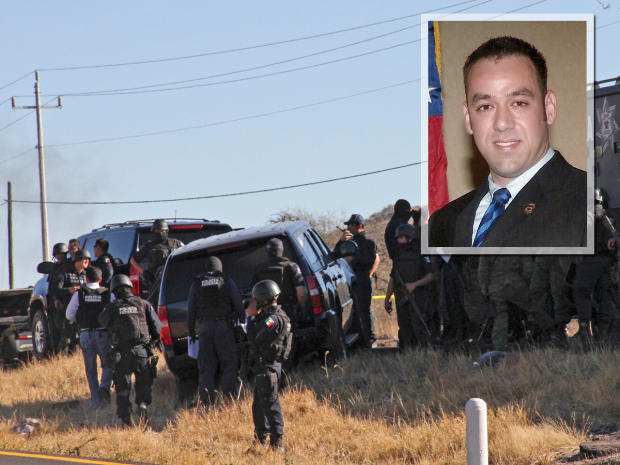A forceful message to the Mexican Cartels
The massive, ongoing sweep of suspected Mexican drug cartel members in the United States, Latin America and Central America is a direct and calculated response to last week's killing of a U.S. law enforcement agent in Mexico.
Named "Operation Fallen Hero" or "Operation Bombardier," the sweep involves every federal law enforcement agency, as well as state and local agencies in all 50 states. And it started in the hours following Tuesday's funeral of Customs and Immigration Enforcement agent Jaime Zapata.
"We're sending a message. We're showing all the cartels that you're not going to bully us. You're not going to push us around. You're not going to murder or harm or pose a threat to a U.S. law enforcement officer," said Carl Pike the assistant special agent in charge of the Drug Enforcement Agency's special operations division. "We're saying, 'we know who you are. We are coming after you, and we will continue to come after you.'"
In the past two days, officers have arrested more than 200 people and seized more than $6 million, in addition to cocaine, marijuana and methamphetamine and more than 100 weapons, Pike said. Most of the arrests were of suspects who had been monitored in ongoing criminal investigations, and Pike said he expects many more as the raids continue through tomorrow and possibly through the weekend.
Pike said there was something like a "school yard mentality" to the ongoing raids.
"A bully comes up and pushes you, and if you don't push back, you're a victim," he said. "We're pushing back."
That pushback has been far-ranging.
The operation is not limited to border cities or big cities. Agents in St. Louis, for example, seized a quarter million dollars, Pike said. In New Jersey, they seized $1 million. And in Dallas, agents found seven assault weapons packaged and ready to be sent to Mexico.
Nor does the operation just involve the federal law enforcement agencies, though all are involved: DEA, FBI, ICE, U.S. Marshals Service, Customs and Border Patrol and the Secret Service. Local law enforcement officers also are working closely with the federal agents, which Pike said was "a huge key to our success."
Suspect says ICE agent was slain in errorJaime Zapata, U.S. Immigration Agent, Shot Dead in Mexico in Apparent Ambush
ICE Agent Death Highlights Risks in Drug War
"When this idea was being formulated, the state and locals all stood up. Small departments. Big departments. They all raised their hands and said, 'we want to be a part of this.'" he said.
In Houston, one local police officer was shot while serving a warrant with federal agents Thursday morning. He is expected to fully recover.
The operation also is not limited to just one cartel. Pike said law enforcement initially decided to focus on the Zetas gang, which is believed to be behind the Zapata killings. But officials concluded that narrow focus would have limited their efforts geographically in the United States, since the cartels operate within specific regions.
"Why just say this to one cartel? All the cartels are culpable. We see them as the same," Pike said.
That makes the sweeps different than other recent operations in the U.S. against Mexican cartels. In October 2009, for example, more than 3,000 federal agents conducted a 20-state sweep that led to more than a 1,000 arrests--but that focused on suspected members of just one cartel, the La Familia gang.
Some intelligence professionals said the 2009 raid had only a temporary impact, and that the La Familia gang is back in force. They questioned the effectiveness of the raids.
"Anyone working for a Mexican cartel that we can take off the street is a good thing. But it's like killing ants in your house; you can spray them all you want and kill plenty, but you're not going to truly solve the problem unless you deal with the huge anthill outside," said Sylvia Longmire, a former intelligence analyst and author of several treaties on the Mexican cartels.
Longmire said the arrests are "a positive thing in the short run," but overall are ineffective in disrupting drug trafficking and dismantling the cartels.
"It's easy for cartels to recruit the kind of people our agencies are arresting in these sweeps, so they'll be replaced soon enough by others," she said.
Pike agreed that raids alone aren't enough.
"The big perception out there is that we take a big action, and all drug trafficking will stop. It doesn't," he said. "What we are doing today is we are disrupting the flow of drugs into the U.S. and the flow of money out of the U.S. as best we can. We are making their lives miserable.
"Is it going to stop them? No," he said. "But we want them to know we are here. We are going to do this. And we will continue to do this. This is an ongoing event."

